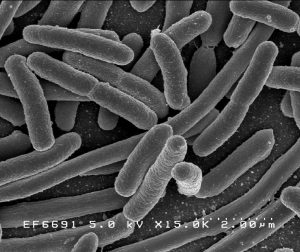What is the Microbiome?
 If you have been experiencing poor digestion, inflammation, depression and weight gain, you also need to understand the role that the gut microbiome plays in your health. The human microbiome is made up of trillions of microbes and the primary location is in the gut. 1, 2, 3
If you have been experiencing poor digestion, inflammation, depression and weight gain, you also need to understand the role that the gut microbiome plays in your health. The human microbiome is made up of trillions of microbes and the primary location is in the gut. 1, 2, 3
How Does It Affect Our Health?
When the balance of these microbes is upset, it can result in many health challenges such as autoimmune disease, diabetes, rheumatoid arthritis, fibromyalgia, and cancer. 4, 5, 6. The influence the microbiome has on our health is widespread which is why it is important to keep it healthy.
Keeping the Microbiome Healthy
The microbiome is dependent on proper nutrients from a balanced healthy diet and eating high quality food. In a healthy individual a diet high in fiber from vegetables, fruits, legumes, and fermented foods is a good plan for keeping the gut in good shape. Eating a variety of different types of plant foods is important, because you will get a varied mix of microbes that have different nutrient benefits.
However, those suffering from pain and inflammation, constipation and or diarrhea may not be able to eat fiber, certain vegetables and fermented foods. This type of diet may create more discomfort. Therefore, those that are having symptoms need to be evaluated and put on a specific diet.
Another aspect to a healthy gut is keeping your life free from stress. By eating correctly, you are keeping your body free from that form of stress. However, there are other forms that will raise stress levels. Stress will increase with lack of sleep, overworking, too much physical exertion or an injury, worry over lack of money, unresolved emotional issues, and exposure to toxic chemicals from unsuspecting use of personal and household products.
One last thing to consider in keeping the microbiome healthy is limiting the use of antibiotics. After a course of antibiotics, it takes time for the gut microbiota to build back up. In some cases, various strains of good bacteria may never return.
Please understand that keeping the microbiome happy is of utmost importance to your health.
1. Lederberg, J. (n.d.). Ome Sweet ‘Omics—a genealogical treasury of words. Retrieved from http://www.the-scientist.com/?articles.view/articleNo/13313/title/-Ome-Sweet-Omics—A-Genealogical-Treasury-of-Words/
2. NIH HMP Working Group: Peterson, J; Garges, S; Giovanni, M; McInnes, P; Wang, L; Schloss, J. A.; Bonazzi, V; McEwen, J. E.; Wetterstrand, K. A.; Deal, C; Baker, C. C.; Di Francesco, V; Howcroft, T. K.; Karp, R. W.; Lunsford, R. D.; Wellington, C. R.; Belachew, T; Wright, M; Giblin, C; David, H; Mills, M; Salomon, R; Mullins, C; Akolkar, B; Begg, L; Davis, C; Grandison, L; Humble, M; et al. (2009). The NIH Human Microbiome Project. Genome Res., 19 (12): 2317–2323. DOI:10.1101/gr.096651.109 PMID 19819907
3. Brown, K., Decoffe, D., Molcan, E., and Gibson, D. L. (2012, August 21). Diet-induced dysbiosis of the intestinal microbiota and the effects on immunity and disease. Nutrients, 4(12), 1095-1119. DOI:10.3390/nu4081095
4. Wu, S., Rhee, K., Albesiano, E., Rabizadeh, S., Wu, X., Yen, H., . . . Sears, C. L. (2009). A human colonic commensal promotes colon tumorigenesis via activation of T helper type 17 T cell responses. Nature Medicine, 15(9), 1016-1022. DOI:10.1038/nm.2015
5. Turnbaugh, P. J., Ley, R. E., Mahowald, M. A., Magrini, V., Mardis, E. R., and Gordon, J. I. (2006). An obesity-associated gut microbiome with increased capacity for energy harvest. Nature, 444(7122), 1027-131. DOI:10.1038/nature05414
6. Bravo, J. A., Forsythe, P., Chew, M. V., Escaravage, E., Savignac, H. M., Dinan, T. G., . . . Cryan, J. F. (2011). Ingestion of Lactobacillus strain regulates emotional behavior and central GABA receptor expression in a mouse via the vagus nerve. Proceedings of the National Academy of Sciences, 108(38), 16050-16055. DOI:10.1073/pnas.1102999108
